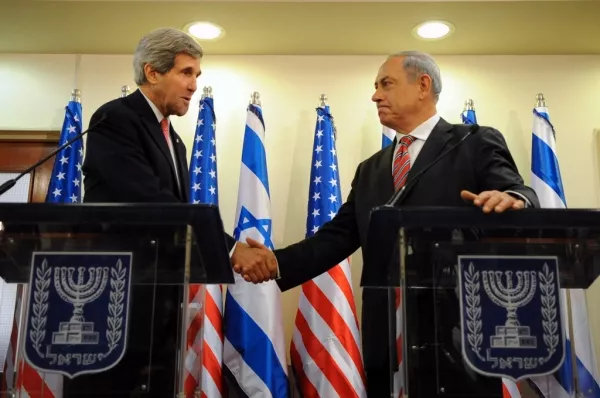In the interim agreement, the international community gets limited constraints on Iran’s nuclear program and gives limited relief of sanctions to Iran. It is no surprise, therefore, that relaxing certain sanctions has become a major item for debate. After the compromise was reached, critics argued that the interim deal would:
- Give Iran far more sanctions relief than the $6–7 billion the Obama administration has advertised;
- Cause the sanctions regime to crumble by prematurely sending a signal to foreign companies that Iran is “open for business”; and
- Relieve pressure on Iran to comply with the terms of the interim deal and to make further concessions required for a comprehensive agreement.
The best defense of the agreement was provided by Undersecretary of the Treasury David Cohen, architect and operator of the vast sanctions regime, in the Wall Street Journal. Cohen’s op-ed argues three main points:
1) The sanctions relief provided—which includes $4.2 billion in direct access to frozen accounts overseas and $1–2 billion in trade revenues from relief on Iran’s petrochemical and auto industries—is “economically insignificant,” “inconsequential,” and of “limited value.”
2) Iran’s economy remains in “deep recession” and will continue to suffer under the weight of the powerful banking, financial, and oil sanctions in place. Gains from the sanctions relief, worth $6–7 billion, will be offset by an estimated $30 billion in losses for Iran’s oil sector over the next six months.
3) Treasury will continue to aggressively identify and penalize companies that do not comply with existing sanctions. (One day after the op-ed was released, Treasury announced new financial penalties against 19 firms and individuals for non-compliance with sanctions on Iran.)
(For an extended version of Cohen’s defense, see the undersecretary’s testimony before the Senate Banking Committee, which can be found here.)
In a similar vein, Secretary Kerry assured members of Congress who question the extent of the sanctions relief that:
We have red-teamed and vetted and cross-examined and run through all the possible numbers through the intel community, through the Treasury Department, through the people in charge of sanctions, and our estimates are that at the end of the six months, if they fully comply, if this holds, they would have somewhere in the vicinity of $7 billion total.
Not entirely persuaded, the chorus of Senators calling not only for sustained pressure, but additional sanctions, remains considerable. However, administration officials’ strenuous efforts to deflect or delay these efforts—as well as the short timeframe before Congress’s holiday recess—have delayed congressional action on Iran until 2014.
As senators, and the rest of us, consider the question of implementing additional sanctions in January—or limit the time given to the Obama administration before new sanctions take effect—it is worth taking stock of the following clarifying analyses.

Best analyses that would lead one to support additional sanctions:
- Yuval Steinitz, Israeli Prime Minister Benjamin Netanyahu’s point-person on Iran, criticizes the P5+1 for relieving sanctions too soon. He argues that “if you accept the formula ‘the greater the pressure, the greater the chances,’ it also follows logically ‘the lesser the pressure, the lesser the chances,’ so don’t ease the pressure on Iran before you achieve your final satisfactory agreement, your final goal.”
- In a post for Iran Matters, Brandeis economist Nader Habibi predicts that the actual value of the six-month sanctions relief package may exceed $24 billion—more than triple the administration’s estimates.
- Rep. Eliot Engel (D-NY), ranking member on the House Committee on Foreign Affairs, advocates passing sanctions with what has been called a “deferred trigger.” While waiting to implement new sanctions for six months, Engel argues that “the threat of sanctions could strengthen our negotiators’ hand” and could “still be used as a club” to pressure Iran to implement the terms of the interim deal. In a December 10 committee hearing, he pointedly asked Secretary Kerry, “Why does the Administration strongly oppose congressional action on Iran sanctions legislation that makes clear new sanctions will not be imposed unless Iran violated the terms of the interim deal?”
Best analyses that would lead one to oppose additional sanctions:
- Kimberly Ann Elliott, a member of the Peterson Institute team that performed the most comprehensive study of sanctions effectiveness to date, writes on ForeignAffairs.com that “there is no evidence in the past 100 years of sanctions history to support [the] premise” that further tightening sanctions “would force Iran to abandon its nuclear ambitions, perhaps by fomenting regime change. . . . In fact, it could do the opposite; while the United States waits for the sanctions’ economic and political payoff, Iran would most likely continue its nuclear program unfettered.”
- Vali Nasr in the New York Times challenges the assumption that Iran faces two and only two choices: agree to a deal or acquiesce to even stricter sanctions. Nasr contends that Iran has a third option, which would become increasingly attractive if more sanctions are imposed: “If Congress sabotages the interim deal by stiffening sanctions and forcing Iran back to a difficult choice, Iran’s leaders will almost certainly bite the bullet and opt for stringent economic reforms . . . rather than a humiliating total abandonment of their nuclear program.” Additional economic pressure, Nasr argues, would be a “colossal error” that makes war with Iran more likely.
- Colin Kahl’s op-ed in Politico asks us to put ourselves in the shoes of our adversaries. He poses a hypothetical counterpart to Congress’s “deferred trigger” sanctions: “Suppose the Majles, Iran’s legislature, passed legislation tomorrow, over Rouhani’s objections, declaring that Iran would resume and escalate its nuclear activities in six months’ time if Washington failed to live up to its Geneva commitments and agree to a final deal that fully respects Iran’s nuclear rights.” Kahl then asks, “How would U.S. lawmakers view such a move? Would they see it as consistent with the letter and spirit of Geneva?” In fact, in retaliation for the recent Treasury Department sanctions against 19 entities, some Iranian legislators are reportedly working on a bill that would require Iran to increase enrichment to 60% for production of naval reactor fuel.
Allison, Graham and Gary Samore. “More sanctions against Iran: yea or nay?.” December 19, 2013




